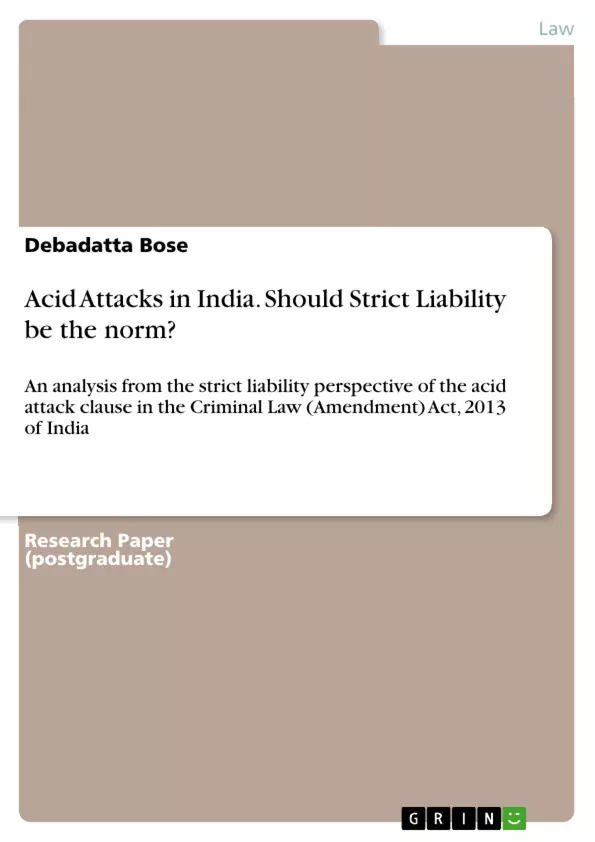This article deals with the Indian Criminal Law Amendment Act, 2013 which was passed as a reaction after the 2012 gang rape case that happened in Delhi and signaled that it was time to change the penal laws for the protection of women.
One change included in the act was Section 326A – relating to acid attacks. This section is gender neutral in nature and this article studies the judicial history of acid attacks and of section 326A, along with providing a critical analysis of the provision in the legislation.
Finally, this article shall study and conclude on the application of ‘strict liability’ on this provision and provide the author’s views on the same whether the legislation we have is adequate enough or not, or what addition should have been made by the government on the face of it from the Law Commission Report.
Inhaltsverzeichnis (Table of Contents)
- Introduction
- Ravinder Singh v. State of Haryana
- Gulab Sahiblal Shaikh v. The State of Maharashtra
- Marepally Venkata Sree Nagesh v. State of Andhra Pradesh
- Balu v. State (represented by the Inspector of police)
- Devanand v. The State
- Ramesh Dey and ors. v. State of West Bengal
- Ram Charittar and Anr. etc. v. State of Uttar Pradesh etc.
- Awadhesh Roy v. State of Jharkhand
- State (Delhi Administration) v. Mewa Singh
- Acid Attack and Strict Liability
- Absolute crimes
- Intentional Crimes
- The Conclusion: Should it be a strict liability?
Zielsetzung und Themenschwerpunkte (Objectives and Key Themes)
This article provides a critical analysis of Section 326A of the Indian Penal Code, 1860, which relates to acid attacks. It examines the judicial history of acid attacks and this specific provision, exploring the application of 'strict liability' and whether the existing legislation is adequate. The author's views are presented regarding the need for potential modifications or additions to the legal framework.
- The introduction of Section 326A in the Indian Penal Code, 1860, following the 2012 Nirbhaya gang rape case and subsequent legal reforms.
- The legal and social context surrounding acid attacks in India, including their history, consequences, and societal impact.
- The examination of judicial precedents and case studies to illustrate the application and interpretation of Section 326A.
- A critical analysis of the potential for implementing 'strict liability' for acid attacks in India.
- An assessment of the sufficiency of the existing legal framework for addressing acid attacks and the need for potential amendments.
Zusammenfassung der Kapitel (Chapter Summaries)
- Introduction: This section defines acid attacks as per Section 326A of the Indian Penal Code, 1860 and outlines the context of its introduction. It highlights the societal outcry following the Nirbhaya case and the subsequent amendments to the law.
- Ravinder Singh v. State of Haryana: This case study focuses on an acid attack incident where the victim, a young woman, was assaulted on a train and later succumbed to her injuries. It discusses the charges filed under various sections of the Indian Penal Code, 1860 and how the case illustrates the legal landscape surrounding acid attacks before and after the introduction of Section 326A.
- Gulab Sahiblal Shaikh v. The State of Maharashtra: This summary will provide insights into the case and its implications for understanding the judicial approach to acid attacks. It will highlight key arguments and legal principles discussed in the case.
- Marepally Venkata Sree Nagesh v. State of Andhra Pradesh: This chapter summary will delve into the case, analyzing the legal arguments and judicial decisions regarding the application of Section 326A. It will shed light on how the court addressed specific aspects of the crime and potential legal issues.
- Balu v. State (represented by the Inspector of police): This section will discuss the case and its significance in the context of acid attacks, highlighting the legal arguments and the judicial response.
- Devanand v. The State: This summary will provide insights into the case, analyzing the legal principles and judicial reasoning involved. It will shed light on the court's approach to specific legal issues related to acid attacks.
- Ramesh Dey and ors. v. State of West Bengal: This section will discuss the case and its implications for understanding the legal landscape surrounding acid attacks in India. It will highlight key arguments and legal principles discussed in the case.
- Ram Charittar and Anr. etc. v. State of Uttar Pradesh etc.: This summary will provide insights into the case and its significance in the context of acid attacks, highlighting the legal arguments and the judicial response.
- Awadhesh Roy v. State of Jharkhand: This section will discuss the case and its implications for understanding the legal landscape surrounding acid attacks in India. It will highlight key arguments and legal principles discussed in the case.
- State (Delhi Administration) v. Mewa Singh: This summary will provide insights into the case, analyzing the legal principles and judicial reasoning involved. It will shed light on the court's approach to specific legal issues related to acid attacks.
Schlüsselwörter (Keywords)
The article focuses on acid attacks, Section 326A of the Indian Penal Code, 1860, judicial history, strict liability, legal analysis, criminal law, gender neutrality, victim compensation, societal impact, Nirbhaya case, criminal law amendments, and judicial precedents. The text explores key themes such as the evolution of legal frameworks, the role of judicial interpretation, and the need for effective legal responses to acid attacks.
- Citar trabajo
- Debadatta Bose (Autor), 2014, Acid Attacks in India. Should Strict Liability be the norm?, Múnich, GRIN Verlag, https://www.grin.com/document/307901




